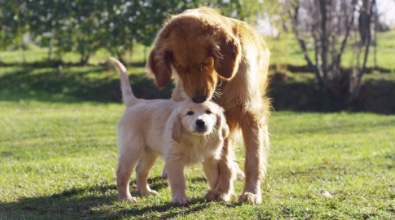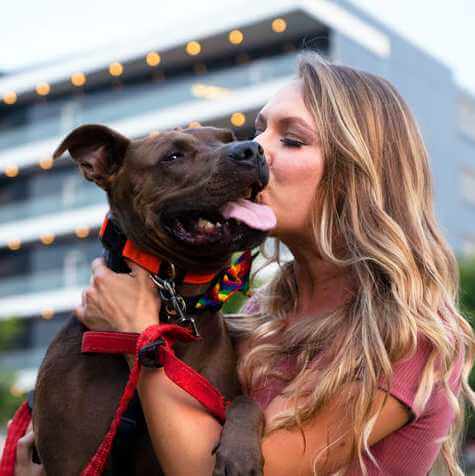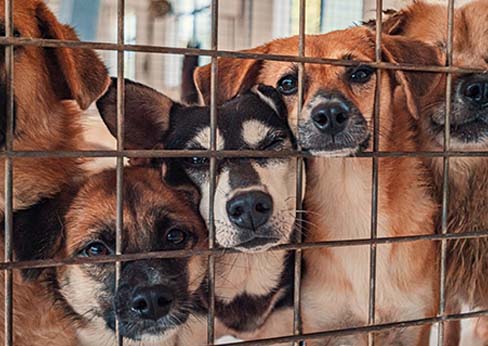A first-time dog owner, it is incredibly important that you before filling out the adoption application. When people come to us, we ask them to fill out a pre-adoption questionnaire. Some of the questions on it may seem obvious or silly, but the responses people give are a great indicator of whether or not they’re ready for the responsibility of taking care of a pet.
If this blog, we’ve outlined the things you should consider before you move forward with adopting a dog. Read through to the end to make sure you have all the information you need!
Check out this adoption guide for some extra support with your decision to add another furry member to your family.
Is your living situation dog-friendly?
This is one of the most important questions prospective pet owners need to ask themselves. Since your new furry family member will be spending most of their time in your living space, it’s important to make sure its a good environment for them.
Larger breeds need more space inside and outside the home. Is there easy access for them to go to the bathroom? Or will you have to walk up and down several flights of stairs every time they want to go outside? Is there a good dog park nearby?
It’s also important to make sure that there are no local laws about owning dogs in your community. You can usually get this information from your local animal control offices, your local shelter, or by simply doing a quick internet search.
Here are some questions you should try to have answered:
- Are there licensing requirements for dogs?
- Is there a specific number of dogs allowed on a single property?
- Are there any Breed Specific Legislatures that you need to be aware of?
You should also check with your insurance provider, as many do not offer home or rental coverage to people who own dogs of a certain breed. If you’re a renter, some landlords do not allow certain dog breeds into their houses.
Consider what pets and other people are already living in your house or apartment building.

Some breeds are bred to chase birds so if you live on a farm and have chickens you may want to steer clear of that breed! Small children and the elderly can also get knocked down by large breeds, which brings us to our next piece of advice…
Do you need a child-friendly dog?
If you have small children, you absolutely need to make sure that the dog you bring into your home is kid-friendly. Of course, no parent wants to adopt a dog that might bite or attack their kids, but you would be surprised how many people don’t consider an animal’s behavioral issues before signing the adoption papers.
If you’ve found a dog that you love, and that the shelter says is kid-friendly, you should still proceed with caution. Bring your children to the shelter so that they can interact with the dog before you take it home with you. These interactions will always be supervised by a trained professional from the shelter, so you can be sure that your children will remain safe.
How to make sure to adopt a cat-friendly dog?
What if you don’t have children, but you do have another pet like a cat? While cartoons would have you believe that cats and dogs are mortal enemies, there is such a thing as a cat-friendly dog! However, since your cat was there first you should see whether or not they’re a dog-friendly cat!
Ask a friend to bring a friendly dog over to see if your cat reacts. Have a hiding place for your cat that the dog can’t get into! That way, if your cat feels overwhelmed or scared of the dog, they have a place that they can go and to calm down and feel safe.
Think about what kind of personality your cat has. Are they a crazy wild animal that likes to jump on people and play a little rough? If so, then you need to look for a patient, calmer dog who won’t snap when your cat startles them. Or is your cat an old man that likes his quiet and would hate to have a young puppy bothering him?
For our part, we test all dogs who come into our care for whether or not they will get along with cats. We don’t just throw them into a room filled with cats since that would be much too stressful and could result in an absolute disaster. What we do is put them on a leash, then casually walk them through our cat-room, where all the cats available for adoption are safe in their individual crates. This gives the dog the opportunity to smell and see the cats, without being suddenly surrounded by them.
Does a dog’s age make a difference when adopting?
The cuteness of a puppy is hard to resist and may seem appealing to most people looking to get a pet. A lot of the time, people head straight for the younger dogs and puppies, passing right by the older dogs with grey snouts.
However, it is actually beneficial for a lot of people to get an older dog! The biggest reason is that they’re already house trained! That alone can save you a lot of time, stress, and mess. You also don’t have to worry about training them out of bad behaviors that are typical of puppies, like chewing on everything. And don’t listen to the old adage, “you can’t teach an old dog new tricks”. Just because a dog isn’t a puppy anymore doesn’t mean they’re not able to learn! In fact, it’s sometimes easier to train older dogs because they’re typically more patient and have a longer attention span.

Another thing to consider is the younger a dog is, the more energy you’ll be spending on them. There will be times when you will think that you have a wild animal in your house from how much energy a puppy can have!
While puppies will mellow out as they get older, all dogs will still have moments when they want to run around and play fetch.
There are breeds who need a lot of exercise and playtime, while other breeds are happy cuddling up on the sofa with you. Raising your puppy or training your dog will take a lot of energy from you. It is necessary to take your dogs on walks and play with them on a regular basis. When these needs are not met, dogs can begin to exhibit destructive behavior, such as chewing up things, digging, and even escaping their yard.
Conclusion
It’s not a bad idea to consider fostering a dog before adopting in order to make sure they are a good fit for you! Always do research on the breed of your new family member and ask shelter workers and/or breeders questions to make sure that both you and your dog’s needs will be met.
Stay in contact with your shelter if anything is not going smoothly. They will be able to help you with the introductions and if things end up not working out. So while getting a new dog is very exciting, it’s important to take your time and do your research!





